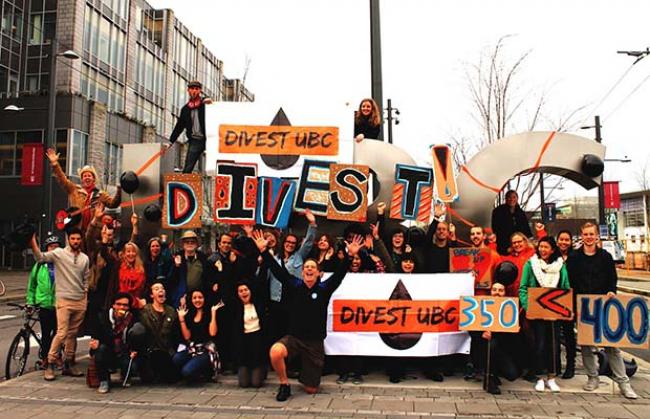Articles Menu

The campaign to get the University of British Columbia to stop investing in fossil fuel companies will push forward even after the board committee voted against divesting, organizers say.
UBC's finance committee on Wednesday rejected a student and faculty-supported proposal to divest its $1.46-billion endowment fund of fossil fuel investments. About $85 million of that is invested in the energy sector.
"The campaign is not going to stop until they divest," said Alex Hemingway, a UBC PhD student and divestment coordinator.
Divestment supporters will hold a "teach-in" next week with speakers from the Canadian Centre for Policy Alternatives and West Coast Environmental Law. After that, if the full board votes to keep investing in fossil fuel companies, anything is possible, from an alumni campaign to sit-ins at the president's office, Hemingway said.
Instead of divesting the endowment of fossil fuel investments, the finance committee is recommending UBC create an alternative low-carbon fund. The "sustainable futures fund" would begin with a $10-million allotment.
The analysis was done by a law firm and is based on five criteria that UBC established, such as whether divestment would make a difference in climate change and whether alternative investments exist that have similar or higher rates of return for the same risk. It finds that the divestment proposal fails to fulfil the fiduciary criteria because it is too broad, being based on an entire industry, while investments are made on a case-by-case basis in regard to both expected return and risk.
Corporate Knights, a magazine and research company that ranks the sustainability of financial products, has created a tool to compare investment returns based on various funds and actual recent returns.
Toby A.A. Heaps, chief executive officer of Corporate Knights, said the tool shows UBC could have made an extra $100 million in the past three years if it had divested of fossil fuel investments. The idea that funds without investments in fossil fuels will make less returns is a myth, he said.
"The whole global economy is heading toward zero net carbon. That's what all the world's countries agreed on," Heaps said. "There are no analysts that I know and no major investors who would be comfortable on the record making the point that over the next 10 to 20 years, this sector is going to perform better than the economy at large."
The University of Calgary, McGill University in Montreal and Dalhousie University in Halifax have all decided against divestment, while Concordia University in Montreal created a $5-million divested fund as part of the school's $130-million endowment.
Last December, a University of Toronto advisory committee recommended that the university divest from fossil fuel companies that "blatantly disregard" efforts to halt climate change. University president Meric Gertler is expected to make a final decision on the matter by the end of March.
Hemingway said there was one dissenting vote on the committee and that was from a student who is on the responsible investing committee. The full board will vote on the issue Feb. 15.
Divest UBC criticized the board for the "closed door" process in how it dealt with the divestment proposal. UBC's committee that explored divestment refused to meet with the divestment campaigners, Hemingway said.
"We're talking about my generation's future on this planet," says Roxanne Hasior, a fourth-year engineering student and Divest UBC campaigner. "Divestment is not a difficult decision. Every major constituency across the university has shown its support. Does UBC really plan to ignore its own students, faculty and staff, in order to do the wrong thing?"
Divestment was discussed in emails released as part of freedom of information requests into former president Arvind Gupta's departure. John Montalbano, the former board chairman at UBC and the former CEO of RBC Global Asset Management, said Wednesday in an email that those statements do not accurately reflect his views on socially responsible investing.
"My personal and professional belief is that fossil-fuel free alternatives need to be available for investors," Montalbano said. "As a result, I have long advocated for strong (socially responsible investing) principles for the large endowment, and encouraged consideration of the creation of a new endowment that is fossil free. I believe, alongside many others in the broader community, that UBC must be a leading voice in the fight to stall and reverse climate change through its actions, including research and investing."
On Tuesday, a group called Take Back Tuum Est, made up of students, faculty, alumni and staff, protested outside the board meeting to push for a review and reform of the governance structure at the university. The group is calling for fewer provincially appointed board members and a recall of all appointed members on the board.